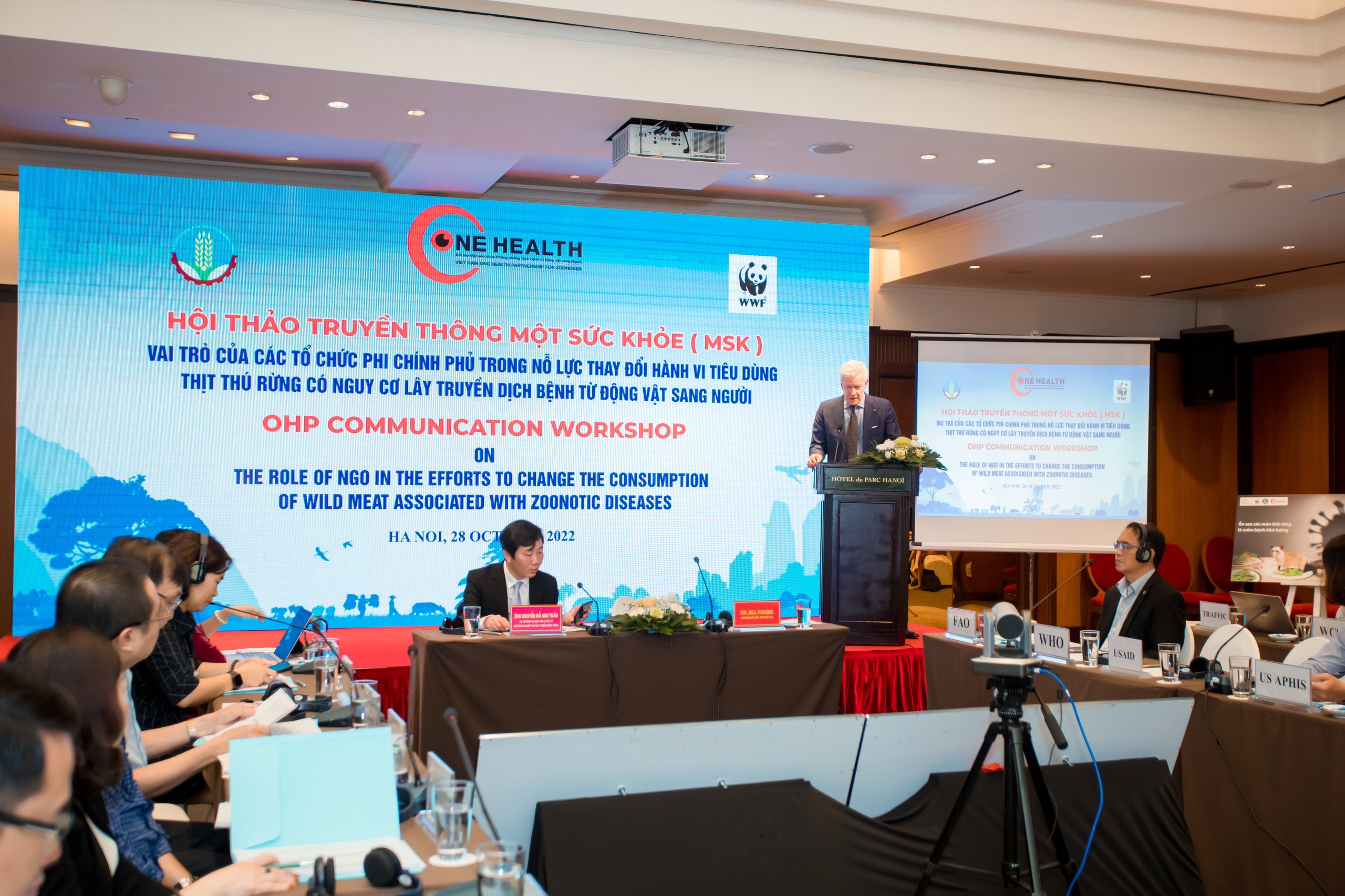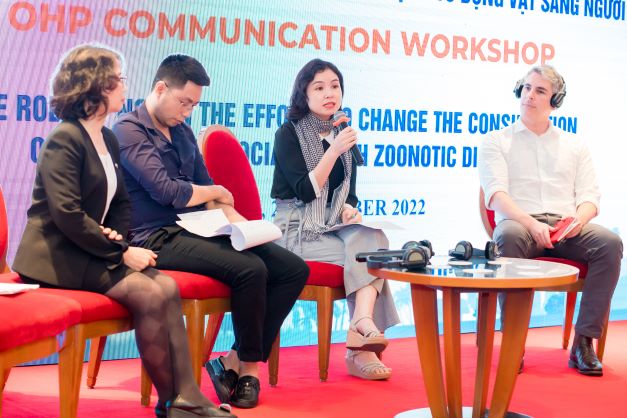Vietnam is recognized as one of the world's most biodiverse…

Cooperation in behavior change efforts against consumption of wild animal meat
PanNature’s representative attended the workshop “Roles of Non-Governmental Organizations (NGO) in behavior change efforts against consumption of wild animal meat to prevent the risks of zoonotic diseases outspread” to share PanNature’s communication activities and strategies on awareness raising and behavior change to protect wildlife.

The event was organized by Ministry of Agriculture and Rural Development and World Wide Fund for Nature in Viet Nam (WWF-Viet Nam) in the agriculture partnership framework and implementing the One Health Partnership (OHP) for Zoonotic Diseases, on 28/10/2022, in Ha Noi.
The Forum welcomed 130 participants from 90 national and international institutions, including signatory partners, namely 03 Ministries and 29 international development partners, and in particular, nearly 40 NGOs. Joining the Workshop through online connections were hundreds of participants from 23 provinces/ municipalities across the country, representing provincial Departments of Agriculture and Rural Development, Departments of Natural Resources and Environment, Departments of Health, Divisions of Animal Health and Husbandry, National Parks and partners in the international One Health (OH) network.
In his speech at the Workshop, Mr. Nguyen Do Anh Tuan, Director General of the International Cooperation Department, on behalf of the OH Partnership Framework chairing Ministries, stated the Workshop’s mission as providing support to implementation of some objectives set for OH Partnership Framework in 2021-2025 period, as signed on 23/3/2021. Accordingly, the Framework was co-chaired by 03 Ministries (MARD – Ministry of Agriculture and Rural Development, MOH – Ministry of Health, and MONRE – Ministry of Natural Resources and Environment) and signed among 29 development partners.
Such objectives include: (1) Mobilizing resources and knowledge from NGOs to prevent the risks of zoonotic diseases outspread from wildlife; (2) Establishing a platform for dialogs among NGOs and multi-sector collaboration to mitigate the risks of emergence and outspread of zoonotic pathogens from animals to human; (3) Strengthening food safety control and management through communications efforts on “reducing wild animal meat demand.” This is also a target of the “Behavior change communications campaign against the consumption of wild animal meat by urban consumers” launched by WWF-Viet Nam, which indicates its alignment with the aforementioned objectives of OH Partnership Framework.
In the Workshop, it was affirmed that NGOs play important roles in the efforts to prevent zoonotic diseases outspread under OH Partnership Framework, and in particular, the risks of contracting infectious and pandemic diseases through consumption of wild animal meat. NGOs (WWF, WCS, FHI360, Save Vi?t Nam’s Wildlife, OUCRU, TRAFFIC, Four Paws, PanNature, ILRI, IRD, Woolcock…) presented their campaigns, action plans and programs in order to achieve the objectives of OH Partnership Framework and highlighted the spirit, responsibilities, and missions of NGOs in pursuit of community health, raising awareness on food safety and reducing demands of wild animal meat to none.

Mr. Bill Possiel, Director of Preservation, WWF-Viet Nam, co-chairman of the Workshop called out for NGOs and stakeholders to take action, hand in hand, and work towards a change in awareness and the habit of consuming wild animal meat by all social classes in Viet Nam. It was proven by facts that zoonotic diseases could transfer onto human. Refusal to consume wild animal meat was the best way to protect community health as well as rare wild animal genes. In particular, as a supportive response to the OH approach, on 21/10/2022, WWF-Viet Nam launched a communications campaign aiming at reduced consumption of wild animal meat for protection of public health and the nature. Consumers would be informed of the serious risks they would face when eating wild animal meat so that they themselves would decide to change behaviors for their own good health and their communities. The campaign will also aim at the general public in an effort of changing social awareness, preventing the risks of pandemics breaking out. The campaign is being piloted in Viet Nam, Laos and Cambodia, where ongoing consumption of wild animal meat takes place.
In his perspective, each NGO, each social civil organization, each social professional association has their own important role and strength in specialty. However, only when working together in Viet Nam OH Program, of which the core is the co-chairmanship of MARD, MOH and MONRE, we can succeed in protecting communications health, wildlife as well as preserving and sustainably developing natural ecologies.
It was highlighted in the Workshop that OH Partnership Framework was managed in a participatory manner, with key actors being partners, NGOs, social civil organizations, private sectors, collaborating with Viet Nam’s government agencies, under the coordination and connection by OH Coordination Office. This implementation arrangement would ensure smooth implementation of OH Partnership Framework and its alignment with situations and demands of Viet Nam and the world for OH partnership. Adoption of One Health approach was confirmed.
For the coming period, all Parties wanted to inclusively promote all OH aspects in the interfaces of animals, plants, and the ecology and voiced their commitment to strengthen cooperations in preventing zoonotic diseases, particularly communications efforts to change behavior and habit of consuming wild animal meat. NGOs also proposed some collaborative measures, activities and program that address shortcomings and gaps in the existing regulations on zoonotic diseases, especially those related to wildlife supply chains in order to secure multi-sector engagement and agreement among stakeholders.
Development partners, including Embassies, US and French development agencies, WHO, FAO, UNDP etc. all pledged their support to the Government of Viet Nam in governance of wildlife trade and consumption, prevention of zoonotic diseases with OH approach for executing the missions and achieving the objectives set in the national OH master plan in the 2021-2025 period.



